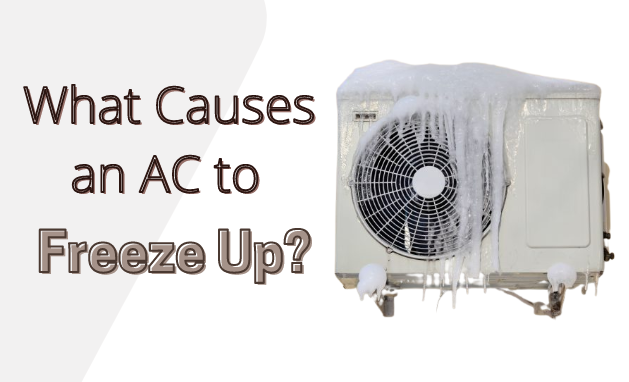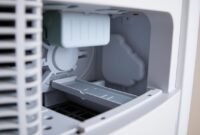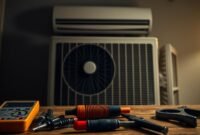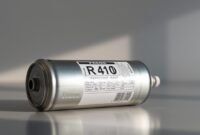“The most sophisticated people I know – inside they are all children.” – Jim Henson
Just like a child’s unexpected tantrum, air conditioners can surprise us with their quirky behavior. An air conditioner freezing up might seem counterintuitive, but it’s a common problem. It can leave homeowners scratching their heads.
Dealing with a frozen AC unit is frustrating. It’s not just an inconvenience—it could signal deeper system problems. These problems might lead to expensive repairs.
In this guide, I’ll explain what causes an air conditioner to freeze up. I’ll help you diagnose and potentially prevent these chilly breakdowns. Whether you’re dealing with a frozen AC unit or want to understand warning signs, you’re in the right place.

Understanding the root causes of your air conditioning system’s freeze-ups can save you time, money, and discomfort. Let’s dive into the cool world of AC troubleshooting!
Understanding Your AC System’s Freezing Problem
As an HVAC pro, I’ve seen many AC systems freeze up. Knowing how your AC works is key to fixing these issues. Air conditioning isn’t magic; it’s a system designed to cool your home well.
Your AC system needs a balance of air flow and refrigerant to work right. HVAC techs know that cooling involves many parts working together smoothly.
How Your Air Conditioning System Works
Your AC system uses a cool heat transfer process. Here’s how it works:
- Warm air is pulled from your space
- Air cools over evaporator coils
- Refrigerant in coils absorbs heat
- Cooled air is sent back into your home
Signs of a Frozen AC Unit
Spotting a freeze-up early can save you money. Look out for these signs:
- Weak or warm air from vents
- Ice on the outdoor unit
- Unusual sounds like hissing or bubbling
- More humidity inside your home
The Role of Evaporator Coils
Evaporator coils are vital for cooling. They hold cold refrigerant that takes heat from the air, cooling your home.
| Coil Component | Primary Function | Potential Issues |
|---|---|---|
| Refrigerant | Absorb Heat | Leaks or Low Levels |
| Coil Surface | Heat Exchange | Dirt Buildup |
| Air Flow | Facilitate Cooling | Restricted Circulation |
Knowing about these parts helps keep your AC running well. Regular checks by HVAC pros ensure your air flows well and your home stays cool.
What Causes an Air Conditioner to Freeze Up

Knowing why your air conditioner freezes can save you money and keep your home cool. Ice on AC coils is a big problem that can harm your cooling system.
Several key factors contribute to AC freezing:
- Restricted airflow from dirty air filters
- Low refrigerant levels causing system stress
- Malfunctioning blower fan
- Blocked condensate drain lines
Dirty air filters are often the main cause. When they get clogged, they block air flow. This makes your evaporator coils too cold, causing ice to form.
Low refrigerant levels also cause freezing. Without enough refrigerant, your AC’s pressure drops. This leads to temperature imbalances, making your evaporator coils too cold and causing ice buildup.
Spotting these signs early can prevent big AC problems and costly fixes. Regular maintenance, like changing air filters and checking refrigerant, keeps your system working well.
Low Refrigerant Levels and System Leaks
When your air conditioning system starts to have refrigerant problems, it can really affect your indoor air quality. It can also cause serious performance issues. Refrigerant leaks are a big problem that can make your air feel frozen and even break your system.
Detecting Refrigerant Leaks
Many homeowners find it hard to spot refrigerant leaks. The signs are often small but very important to notice:
- Unusual hissing sounds near the AC unit
- Decreased cooling performance
- Ice formation on refrigerant lines
- Higher energy bills
Impact on System Performance
Low refrigerant levels can really hurt your air conditioning system’s performance. When there’s not enough refrigerant, the system has to work harder to cool your home. This can lead to higher energy bills and damage to the compressor.
Health and Safety Concerns
Refrigerant leaks are not just a mechanical problem. They can also be dangerous for your health and home. A faulty blower fan and refrigerant leaks can spread harmful chemicals in your home.
Professional HVAC technicians have the right tools to find and fix refrigerant leaks safely. I always suggest calling experts who can solve these complex problems without risking your health or system.
Restricted Airflow Problems and Solutions

Restricted airflow can seriously damage your air conditioning unit. When air circulation becomes blocked, your AC system struggles to maintain proper temperature and functionality. Understanding these airflow problems is key to avoiding expensive repairs.
Several common issues can cause restricting air in your cooling system:
- Closed or partially blocked air vents
- Furniture blocking register openings
- Damaged or collapsed ductwork
- Dirty air filters preventing smooth air movement
I recommend performing regular checks on your home’s air circulation paths. Walk through each room and ensure vents are completely open and unobstructed. Remove any furniture or curtains blocking air registers. Check your ductwork for damage or compression that might impede airflow.
Read also: How to Check the Freon in a Home Air Conditioner
Maintaining proper air circulation helps prevent your air conditioning unit from freezing up. When airflow becomes restricted, cold air accumulates around the evaporator coil. This can cause freezing and system malfunction. Catching these issues early can save you from costly system repairs.
Professional HVAC technicians can perform detailed airflow assessments. They can identify and resolve circulation problems. Regular maintenance is essential to keep your cooling system running efficiently and prevent unexpected breakdowns.
The Impact of Dirty Air Filters on AC Performance
Dirty air filters are often the hidden cause of air conditioner freezing. They play a big role in keeping your AC system running well. This helps prevent your air conditioner from freezing up.
A dirty air filter blocks airflow, leading to a frozen ac unit. When air can’t move freely, the evaporator coil gets too cold. This can cause moisture to freeze and harm your air conditioning system.
How Often to Change Air Filters
Changing your air filters regularly is important to avoid AC freezing. Here’s when to change them:
- Standard homes: Every 90 days
- Homes with pets: Every 60 days
- Homes with allergies or multiple pets: Every 30-45 days
Choosing the Right Filter Type
Not all air filters are the same. Think about these things when picking a filter:
- MERV rating (higher isn’t always better)
- Your home’s specific air quality needs
- Your AC system’s manufacturer recommendations
By keeping up with air filter maintenance, you can lower the chance of your air conditioner freezing. This also helps your system work its best.
Faulty Blower Fan and Its Effects
Is your air conditioning system not cooling your home? A faulty blower fan might be the problem. As an HVAC expert, I’ve seen many cases where this issue affects comfort and system performance.
The blower fan is key for air flow in your cooling system. It moves air over the evaporator coils and spreads cool air in your home. If it breaks down, your AC system can face big problems.
- Weak airflow from vents
- Unusual grinding or squealing noises
- Inconsistent cooling in different rooms
- Increased energy consumption
HVAC techs often find a few main reasons for blower fan troubles:
- Worn-out motor bearings
- Electrical connection problems
- Accumulated dirt and debris
- Damaged fan blades
If you see signs of a blower fan problem, get a pro to check it out. Skilled HVAC techs can find and fix these issues. This keeps your system cool and efficient.
Read also: What Causes Condensation on AC Vents?
Condensate Drain Line Issues
Your air conditioning system’s condensate drain line is key to keeping the air inside your home clean. It removes extra moisture from your AC. This helps prevent frozen air problems and water damage to your home.
If the drain line gets clogged, it can cause big problems. A blocked drain can lead to water backing up. This can seriously affect how well your air conditioner works.
Identifying Drain Line Clogs
Look out for these signs that your condensate drain line might be clogged:
- Water pooling around your indoor AC unit
- Musty odors near the air conditioning system
- Unexplained moisture or water stains
- Unusual sounds coming from the AC unit
Proper Maintenance Techniques
Preventing problems with your faulty blower fan and drainage system is important. Here are some tips:
- Check the drain line monthly for blockages
- Use a vinegar and water mix to clean the line
- Install a drain line trap to stop debris buildup
- Think about getting professional maintenance every year
Regular cleaning and checks can prevent expensive repairs. They also make sure your air conditioning works well all summer.
How to Prevent Your AC From Freezing
To keep your air conditioning unit working well, you need to take care of it. By doing so, you can avoid costly repairs and make sure it works great all summer.
It’s smart to have a plan for keeping your AC in good shape. Regular maintenance can make your system last longer and prevent sudden problems.
- Change air filters every 1-3 months to prevent restricting air flow
- Keep outdoor unit clear of debris and vegetation
- Maintain consistent indoor temperature settings
- Schedule annual professional inspections
Doing important maintenance tasks can save you money. It’s key to check your AC’s refrigerant and make sure air flows well to stop it from freezing.
| Maintenance Task | Frequency | Benefit |
|---|---|---|
| Air Filter Replacement | Every 1-3 months | Prevents airflow restrictions |
| Professional Inspection | Annually | Identifies possible system problems |
| Outdoor Unit Cleaning | Seasonally | Keeps the system running well |
By following these tips, you can stop your AC from freezing and avoid expensive fixes. Being proactive with maintenance will keep your system efficient and extend its life.
Conclusion
Knowing why an air conditioner freezes is key to a comfy home. We’ve looked at many reasons, like refrigerant problems and blocked airflow.
To stop your AC from freezing, keep up with maintenance and watch for signs. Change filters often, get your HVAC checked, and fix small issues early. Simple actions like checking airflow and keeping your system clean can help a lot.
While you can try some fixes yourself, serious problems need a pro. Find a reliable HVAC tech to help you out. This way, your AC will work well all summer.
It’s cheaper to prevent problems than to fix them later. Learning about and caring for your AC will keep your home cool and comfy. And it will avoid sudden breakdowns.


